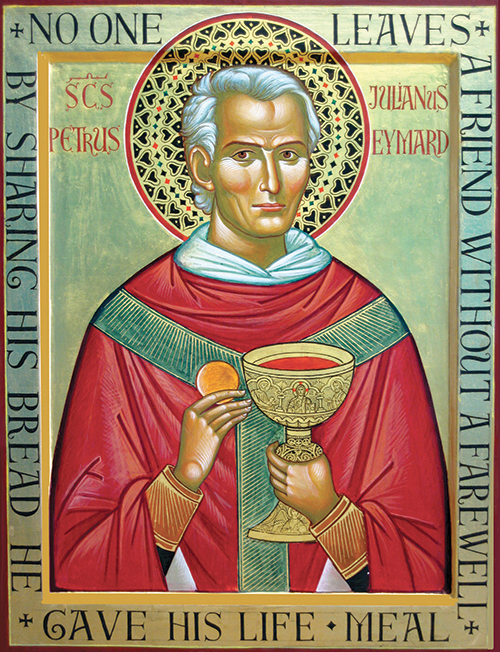
August saint: St. Peter Julian Eymard
There was a frantic search when 5-year-old Peter Julian Eymard wandered away from his family’s home in France in 1816. His siblings looked for him everywhere and finally located the little boy in the parish church; he was standing on a stool in front of the tabernacle. When questioned as to why he was there, he replied simply, “I am here listening to Jesus.”
Peter Julian Eymard would spend the rest of his life listening to Jesus.
For those Catholics born in France in the first half of the 19th century, life was often difficult. Eymard, who entered the world in 1811, was surrounded by cultural obstacles to his faith. The French Revolution of the previous century had drastically altered the religious landscape of the country, and anti-clericalism was pervasive. It was also a time when the movement known as Jansenism was having a profound impact on the Church; subsequently declared a heresy, Jansenism “focused on the gravity of human sinfulness and a belief in the unworthiness of human motivation and activity.”
Despite this, Peter was determined to be a priest. Initially, he was ordained to the Diocese of Grenoble in 1834 and later professed vows as a member of the Society of Mary – the Marists. Inspired by a life-long devotion to Mary, Father Eymard became a particularly effective and popular preacher of Eucharistic devotions. In 1845, on the feast of Corpus Christi, while carrying the Blessed Sacrament in a procession in Lyons, he had a profound experience of Christ present in the Eucharist. So powerful was this incident that it determined the trajectory of the rest of his life. Because of it he resolved “to preach nothing but Jesus Christ, and Jesus Christ Eucharistic.”
Unfortunately, he was unable to bring his vision to completeness within the Marist Order, and so in 1856, he made the painful decision to leave them and found a new congregation dedicated to the Eucharist. The Congregation of the Blessed Sacrament had a rocky start – initially he could not get approval for the order either at the diocesan or papal level. When that was finally secured in 1856, financial set-backs also plagued him; on a couple of occasion, he and his small band of followers were so poor that they had to rely on a neighboring convent of sisters to feed them.
However, Father Eymund persisted with his vision of the centrality of the Eucharist, as well as a spirituality focused, not on human sin and reparation, but on one that emphasized the love of Christ. Many years before the Second Vatican Council, he envisioned communities comprised of all people, ordained and lay, devoted to the spiritual values and charitable activity inspired by a devotion to the Blessed Sacrament. For Father Eymand, the Eucharist was the center of every Christian life.
Plagued by ill health for many years, Father Eymard died in France in 1868 and was canonized by Pope John XXIII in 1962. The patron of Eucharistic Revival, his feast is celebrated on Aug. 2.

